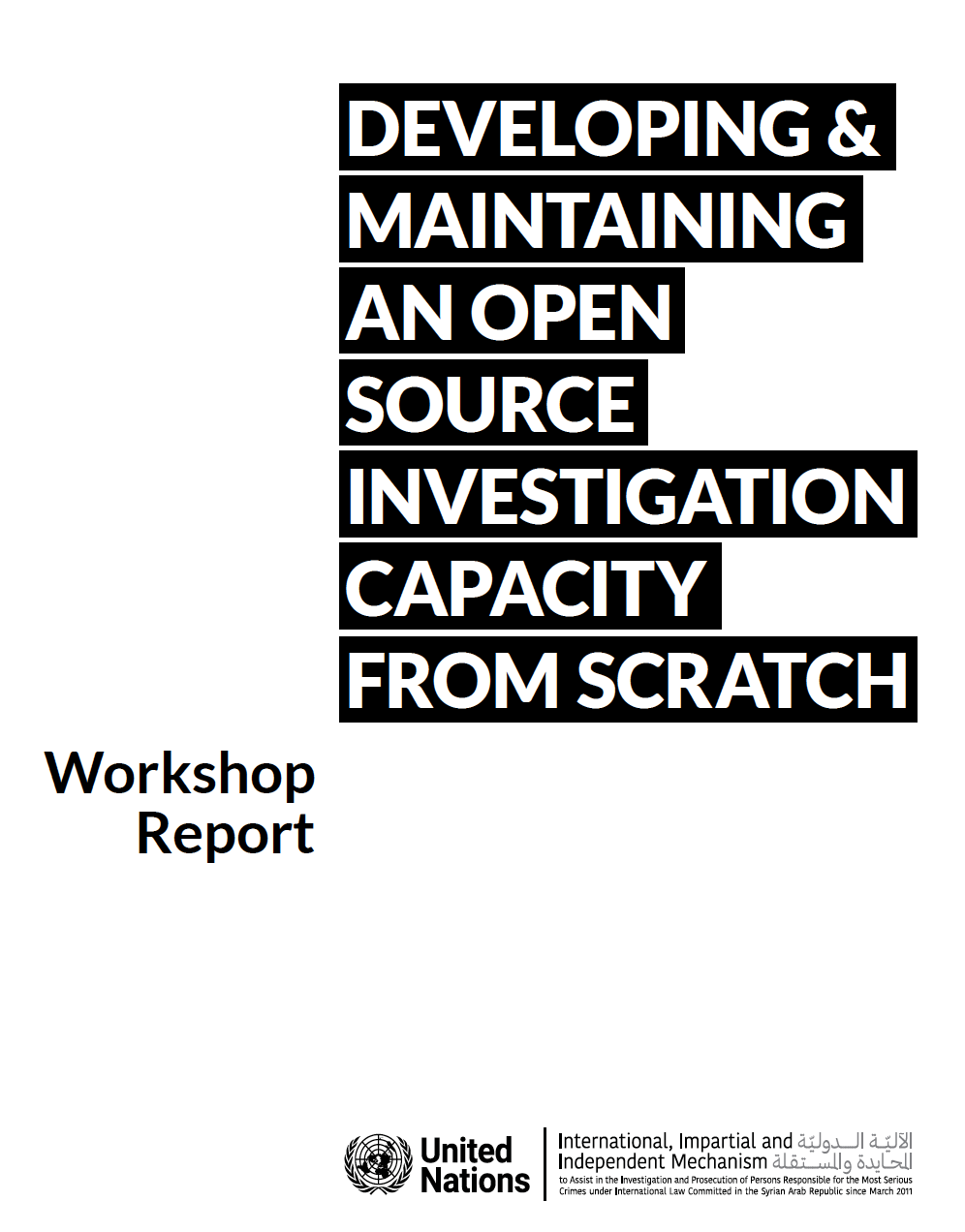
The benefits of open source information in investigations of violations of international criminal, human rights, and humanitarian law are widely acknowledged and well-documented.
However, issues relating to establishing dedicated open source investigation operational capacities have garnered less attention, particularly in defining relevant processes and building the necessary infrastructure to support open source investigators. These issues are not unique to any one organization, but impact investigative and accountability bodies involved in open source activities worldwide.
To address this gap, the IIIM invited accountability- and investigative-focused international organizations, nongovernmental organizations (NGOs), and civil society organizations (CSOs) to a closed workshop on information and evidence management in the context of open source investigations. The event itself was situation-neutral and did not involve sharing substantive information about any open source investigations or analyses.
This workshop provided participants with a unique opportunity to share best practices and lessons learned from leading organizations in the field. Case studies and panel discussions addressed shed light on various issues.
This report summarizes the discussions that took place.
To read the full report click here.
IIIM statement on Stuttgart Higher Regional Court Trial


Geneva, 16 June – The IIIM welcomes the Trial Judgment by the Stuttgart Higher Regional Court in the case of Alaa M., sentenced to life imprisonment for war crimes and crimes against humanity.
The former Syrian doctor was found guilty of torturing, sexually abusing, and killing detainees at the Homs Military Hospital and a military intelligence facility between 2011 and 2012.
The IIIM supported the investigation by providing information and evidence, and by facilitating the testimony of a key witness. Universal jurisdiction cases represent one of the important avenues to provide justice for victims/survivors of crimes committed in Syria.
IIIM and Institution on Missing Persons strengthen cooperation
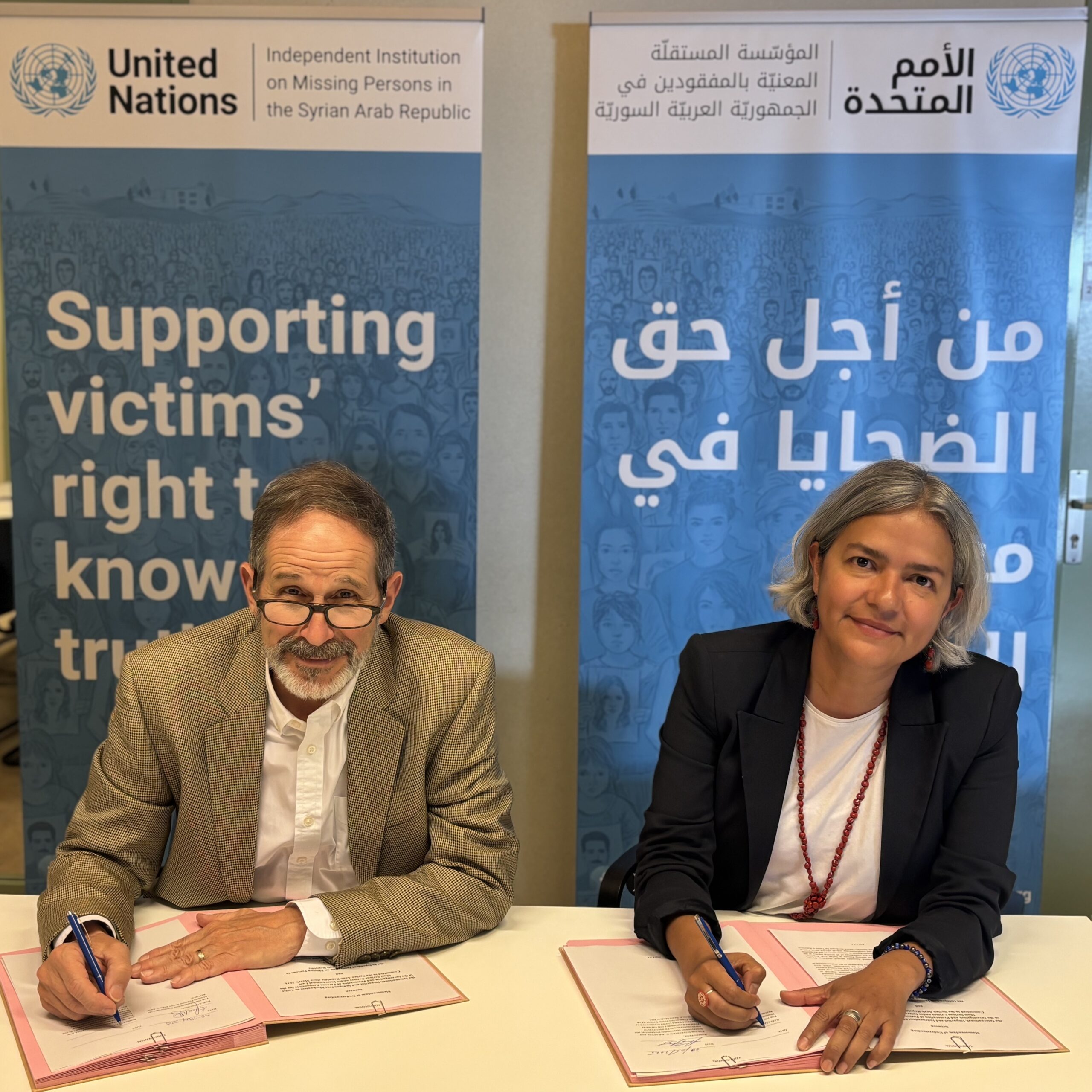

Geneva, Friday 30 May 2025. The Independent Institution on Missing Persons (IIMP) and International, Impartial and Independent Mechanism (IIIM) signed a memorandum of understanding to enhance cooperation between both entities, with a focus on supporting the search for missing persons in Syria.
Karla Quintana, Head of the IIMP, and Robert Petit, Head of the IIIM, have coordinated efforts closely since Ms. Quintana took office. “This partnership reflects our shared commitment to addressing the profound suffering of families searching for their loved ones. While the IIMP’s humanitarian mandate is focused on the urgent need to clarify the fate of the missing, the IIIM remains dedicated to ensuring that those responsible for serious crimes are held accountable. Together, we aim to support a more comprehensive coordinated approach to justice and truth for the Syrian people.”
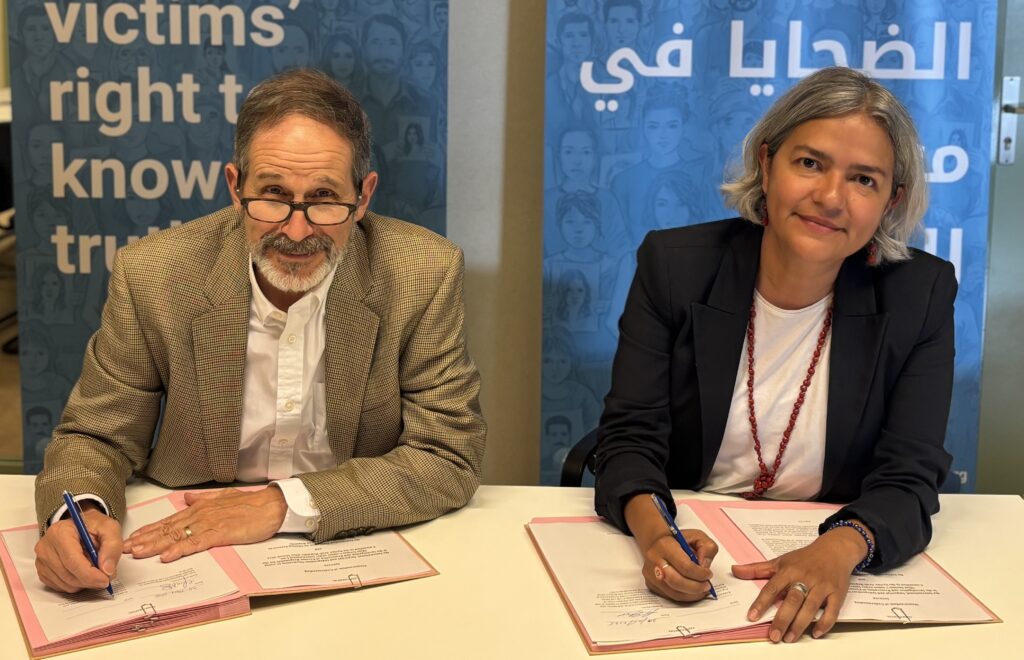
“Justice in Syria by Syrians, for Syrians”


A Syrian-led, internationally supported justice process – this was the key message from ASG Robert Petit, Head of the IIIM, at a timely webinar hosted by the Caesar Families Association and the Truth and Justice Charter. The discussion focused on the perspective of Syrian families following the establishment of two long-awaited National Commissions on Transitional Justice and Missing Persons.
ASG Petit emphasized the importance of national ownership in justice processes:
“Our mandate is to prepare for substantive accountability for crimes committed in Syria… The best scenario, certainly the most important, is justice in Syria by Syrians for Syrians… for Syrians to dispense justice for victims and survivors of crimes committed, regardless of the perpetrators.”
Acknowledging the scale and complexity of violations committed in Syria, he added:
“The creation of a National Transitional Justice Commission is a very important first step, but it is only the beginning of a long journey… We stand ready to contribute our technical expertise and support.”

Moderated by Ahmed Helmi from Taafi Initiative, speakers also included:
▪️ Ms. Mariam Al-Hallak, Founder of Caesar Families Association
▪️ Ms. Joumana Seif, European Center for Constitutional and Human Rights (ECCHR)
▪️ Ms. Mayassa Al-Sheikh Ahmad, Human Rights Activist
▪️Ms. Yasmen Almashan, Head of Caesar Families Association
▪️ASG Karla Quintana-Osuna , Head of the Independent Institution on Missing Persons in the Syrian Arab Republic (IIMP)
The panel underscored the importance of centering families and victims in all justice efforts, and discussed how the IIIM can engage with Syrian-led bodies in the pursuit of truth, accountability, and justice.
🔗 Watch the full webinar here: https://lnkd.in/d9ptgjKs
Statement by the IIIM


Geneva, 19 May 2025 – The establishment of an Independent National Commission for Transitional Justice in Syria, as announced through Presidential Decree No.20, is an important first step to address the crimes of the regime.
Given the scale and complexity of violations committed in Syria, no single process will be sufficient to deliver comprehensive and inclusive justice for all of Syria’s victims and survivors. Multiple complementary efforts will be needed to pursue all available avenues for justice.
In line with its mandate, the IIIM stands ready to engage with the National Commission and to contribute to other broader justice efforts aimed at advancing transitional justice and accountability for Syria.
– Ends –
Al Hadath interview with ASG Petit
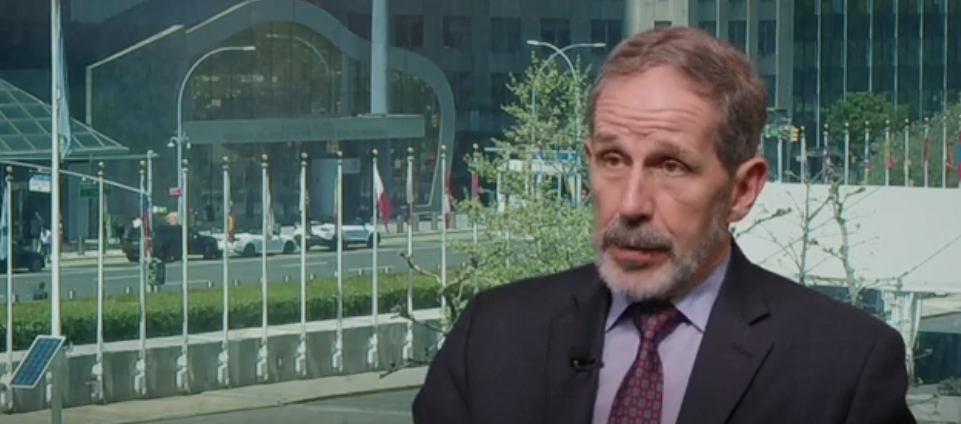

Assistant Secretary General Robert Petit, Head of the IIIM, was interviewed by Al-Hadath about recent developments following the political changes in Syria in December 2024. The interview highlights significant new opportunities for pursuing justice and accountability following the political transition in Syria. Financial constraints remain a serious challenge for international bodies who can provide support for Syria’s transitional justice efforts.
Some of the key points:
- ASG Petit described this period as a “pivotal moment” for achieving justice for Syrians, having visited Syria after the fall of Bashar al-Assad’s regime.
- He talked about meeting with officials from Syria’s interim authorities, including Foreign Minister Asaad Al-Al-Shaibani, who expressed commitment to transitional justice.
- ASG Petit emphasized that Syria’s interim authorities have shown openness and recognition of the need for justice.
- The IIIM stands ready to support Syria’s transitional justice efforts.
- He discussed the Mechanism’s role in helping countries like France issue arrest warrants against former Syrian officials, including Bashar al-Assad and his brother Maher.
- ASG Petit affirmed that justice will eventually be achieved even if it takes time, noting historical precedents of former heads of state facing accountability.
- He highlighted financial challenges facing the Mechanism, which has not seen a budget increase since 2020 and faces a funding gap of $7.5 million for 2025.
- Despite these challenges, ASG Petit reiterated the IIIM’s commitment to continuing its work supporting justice and accountability in Syria.
- The Mechanism will continue supporting other countries’ investigations and when it becomes possible working directly within Syria.
- ASG Petit expressed confidence in continued cooperation with the new Syrian authorities based on positive meetings with officials.
Justice in Syria is no longer an abstract aspiration – it is a concrete opportunity
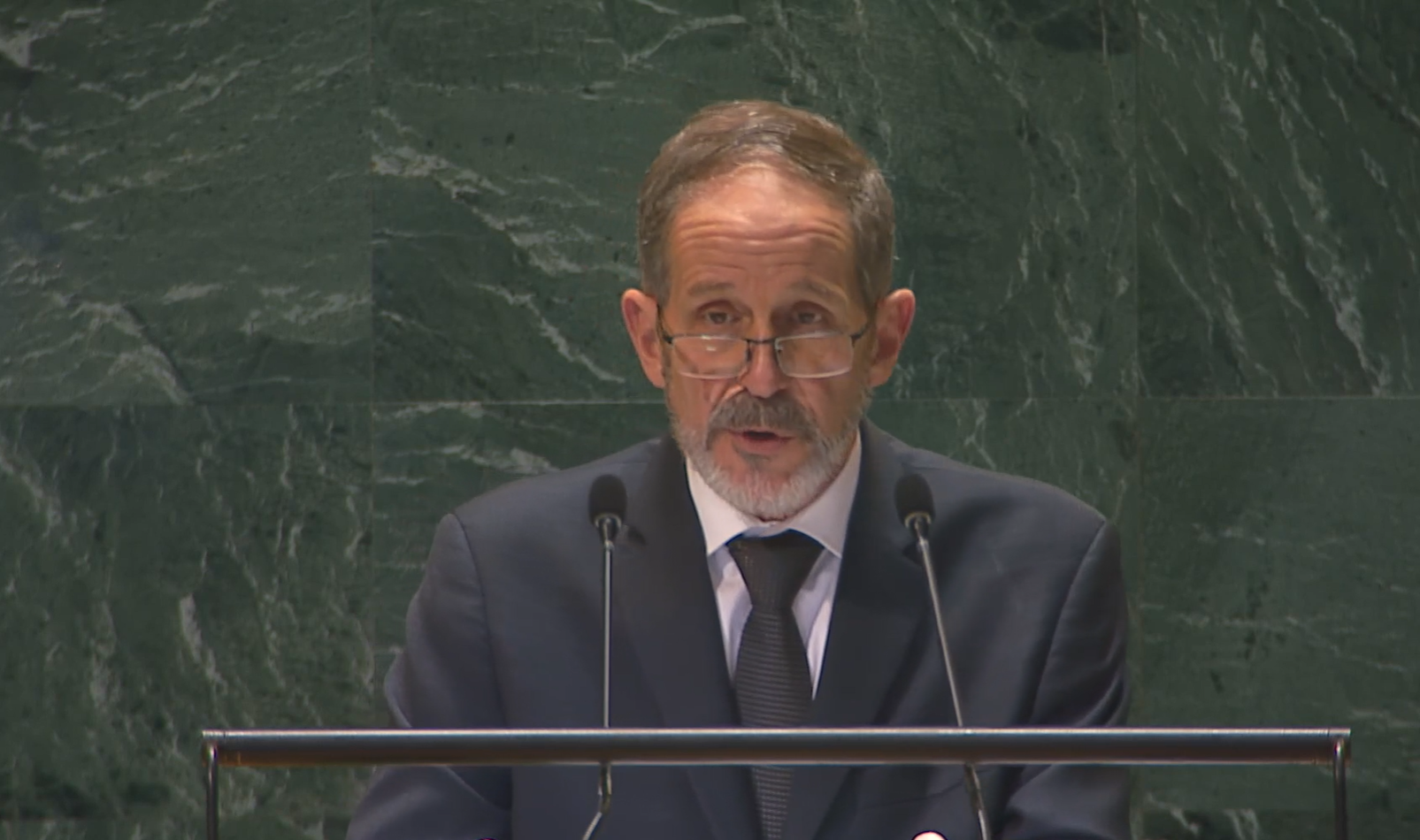

New York, 29 April 2025 – ASG Robert Petit delivered his first briefing to the UN General Assembly as Head of the IIIM. He presented the IIIM’s eleventh report to the GA and updated on progress since the historic events in Syria on December 8 last year.
“The end of more than 13 years of conflict and 50 years of authoritarian rule constitute an opportunity to build a future Syria on justice and the rule of law”.
ASG Petit expressed his appreciation for the constructive dialogue with the Syrian interim authorities during visits to Damascus. He reiterated the IIIM’s readiness to support Syrian-led transitional justice efforts and that the request to be granted authorization to operate in Syria was part of ongoing discussions with officials.
The UNGA session was notable for the presence of Syria’s interim Minister of Foreign Affairs, Mr. Asaad Al-Shaibani who welcomed the IIIM’s work as “a key component of accountability in Syria,” emphasizing that “without accountability, we are unable to prevent future conflict.” He also praised the General Assembly for establishing the IIIM.
“That mechanism has kept Syria and the Syrian people in the minds of the world’s peoples…You’ve condemned the Assad regime’s crimes and ensured that the world hasn’t turned its back on our people.”
ASG Petit highlighted several significant organizational developments and achievements including:
- The IIIM’s first visit to Syria on 21 December 2024, eight years to the day from its creation
- In 2024 alone, the IIIM conducted 154 collection activities, expanding its central repository to 280 terabytes of data
- To date the IIIM has received 466 requests for assistance from 16 jurisdictions related to 321 distinct investigations
- The IIIM has directly contributed to successful justice developments, including landmark convictions for crimes against humanity, war crimes, and genocide across multiple jurisdictions
- The IIIM publicly released for the first time a redacted version of a comprehensive report on the former regime’s detention system, documenting patterns of torture across more than 100 government facilities
ASG Petit noted that the IIIM’s regular budget had not increased since 2020 despite an increase in demand for its assistance. The Mechanism’s now faces a funding gap of $7.5 million for 2025, which he emphasized could grow as “once we better understand the situation in Syria and have clarity on the extent to which we can conduct operations there”. He called for sustainable funding to meet rising demands and the new opportunities now emerging.
The majority of Member States gave strong statements of support for the IIIM, and the progress made by the organization to fulfill its mandate, specifically commended:
- The mechanism’s evidence collection and preservation work
- Its role in supporting investigations and prosecutions across multiple jurisdictions
- Its victim/survivor-centered approach, commitment to inclusive justice and effective engagement with civil society
- The coordination with other UN bodies including the Commission of Inquiry and the Independent Institution on Missing Persons
Many also called increased funding to meet rising demands and the new opportunities now emerging. The IIIM is deeply grateful for the contributions and pledges from Austria, Czech Republic, the European Union, Finland, France, Germany, Hungary, Liechtenstein, Lithuania, Luxembourg, Malta, the Netherlands, Qatar, Spain, Switzerland, and the USA.
In his remarks ASG Petit recognized Syrian civil society for its indispensable role in documenting and sharing evidence of crimes and violations. “At the heart of each document, each testimony, each analysis,” he noted, “are people – many lost, many who have survived – each with a right to justice.”
Watch the full briefing here
Read the IIIM’s briefing here
IIIM Head Concludes his visit to Damascus: Reaffirms Commitment to Supporting Syria’s Transitional Justice Efforts
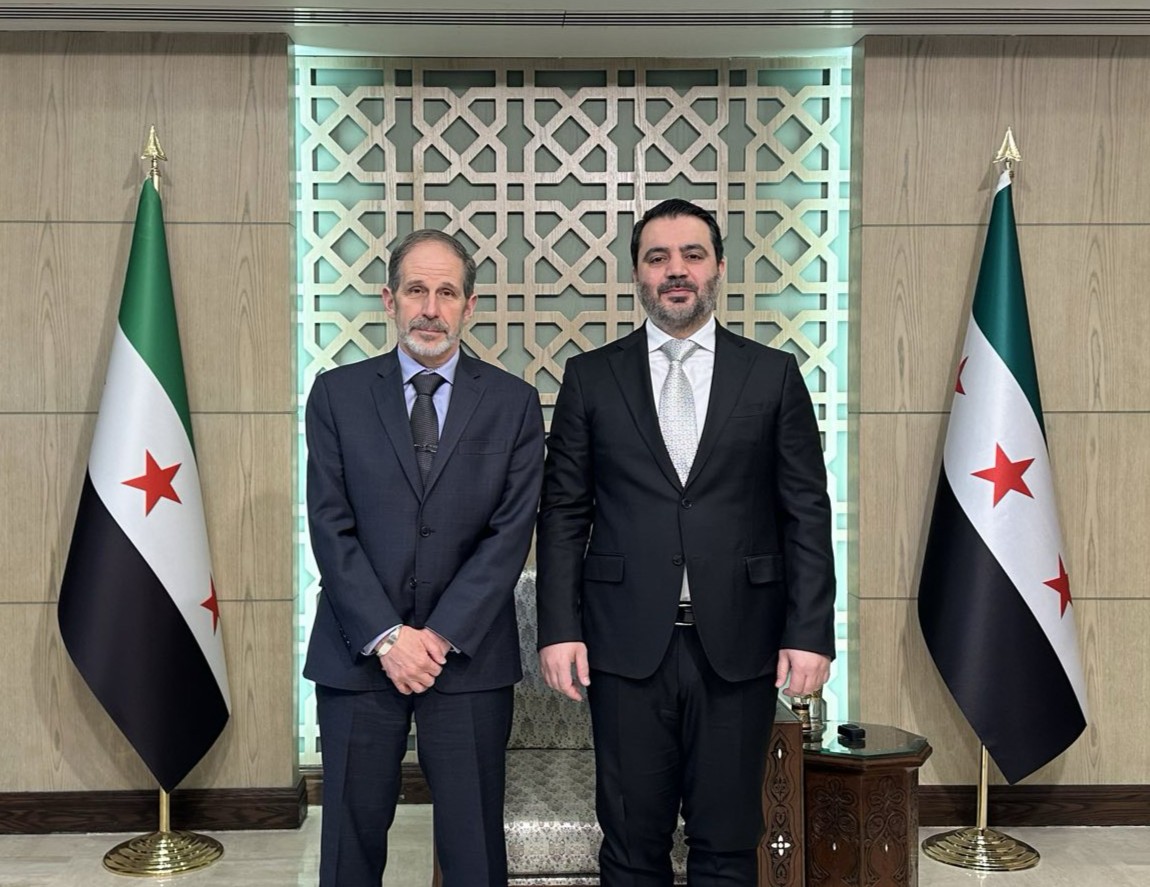

Damascus, April 16, 2025 – Assistant Secretary-General Robert Petit, leading a delegation from the Independent International Impartial Mechanism (IIIM), concluded a series of high-level meetings during his second visit to Damascus, including a meeting with the Foreign Minister Asaad Al Shaibani and officials from the Ministry of Foreign Affairs and Expatriates of the Syrian Arab Republic.
The meetings focused on advancing practical avenues for cooperation in support of accountability and transitional justice. Both parties underscored the importance of a Syrian-led process that is inclusive, effective and responsive to the needs of victims and affected communities.
ASG Petit welcomed the Minister’s expression of commitment to cooperation as part of broader transitional justice efforts.
“It was a constructive meeting, and I appreciated the Minister’s engagement with our mandate,” said ASG Petit. “Syria continues to face many challenges, and the IIIM stands ready to provide practical support on the ground that aligns with the needs of Syrians.”
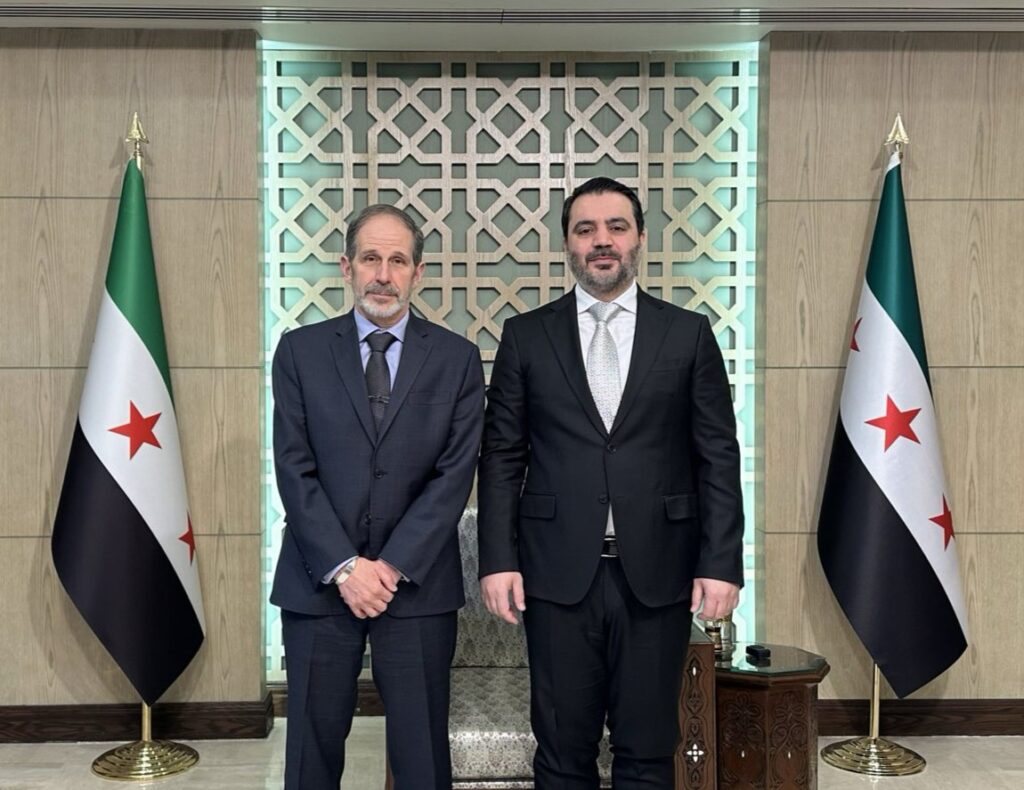
In addition to meetings with officials, ASG Petit met with a number of Syrian civil society organisations and activists to hear directly from those working with victims and survivors advocating for justice. These exchanges reinforced the importance of a broad-based and inclusive approach to transitional justice, which provides space for the voices and experiences of Syria’s diverse communities.
This visit was the latest in regular engagements the IIIM has had with the Syrian Ministry of Foreign Affairs since the fall of the regime in December 2024.
The IIIM remains committed to fulfilling its mandate to assist in the investigation and prosecution of serious crimes, to facilitating constructive dialogue and to contributing to efforts that advance justice and accountability for all Syrians.
For media inquiries please contact: [email protected]
About the IIIM
The International, Impartial and Independent Mechanism (IIIM) is a United Nations organisation, established in 2016 by the UN General Assembly in a landmark vote. It is mandated to assist in the investigation and prosecution of individuals responsible for committing the most serious international crimes (including war crimes, crimes against humanity, and genocide) in Syria since March 2011.
The IIIM works to collect and preserve evidence from multiple sources to support current and potential future accountability proceedings. A significant number of its sources and information providers are Syrian civil society actors.
The IIIM’s work can be used by jurisdictions with the legal authority to prosecute international crimes, thereby supporting accountability for atrocities committed during the Syrian conflict.
It shares information, evidence and analytical products either in response to requests for assistance or proactively with competent jurisdictions.
It integrates a victim survivor centred approach and proactive strategies on gender and children/youth throughout its work, holding regular consultations and engagements with Syrian civil society and victim/survivor communities.
It is not a court or tribunal; it cannot issue indictments or conduct trials and does not have prosecutorial powers.
The IIIM is:
- Independent: Works without external instructions or influences. It does not share details of the justice processes it supports publicly except as authorised by competent jurisdictions.
- Impartial: Works to cover all international crimes committed by all parties in the conflict, no matter the affiliation, without bias.
- Rigorous: Applies international criminal law methodologies throughout all tracks of its work.
Since the start of its operations the IIIM maintained its efforts to initiate cooperation from the Syrian Arab Republic, in line with its commitment to impartial and inclusive justice. Its calls went unanswered until December 2024, when it was invited to access Syria for the first time. 48 hours later the IIIM Head led a small delegation to Damascus coincidentally on the same day as the Mechanism was established in 2016.
-ENDS-
JIT Cooperation Leads to Convictions for Crimes against Ezidis


The IIIM welcomes the news that extensive cooperation within a Eurojust-supported Joint Investigation Team (JIT) has led to the first two convictions of ISIL foreign fighters for crimes against Ezidi victims in Syria and Iraq by Dutch and Swedish courts. This marks a significant step forward in the pursuit of justice for survivors of core international crimes, including genocide, crimes against humanity, and war crimes.
The IIIM is proud to actively support the work of the JIT, contributing to the investigation and prosecution of the most serious crimes committed under international law in Syria. We remain committed to pursuing justice opportunities for all victims/survivors, and ensuring accountability is upheld.
IIIM Head’s interview with Al-Qudas Al-Arabi


“Victims never forget, and acknowledging their suffering is an essential part of any credible transitional justice effort.”
In a recent interview with Al-Quds Al-Arabi, Robert emphasized the need for accountability to prevent victims from resorting to “revenge justice”, which could plunge Syria into chaos. He highlighted the importance of Syrian-led accountability efforts and the IIIM’s role in delivering justice for thousands of victims. Read the full article (Arabic) here.

©Keystone/Salvatore Di Nolfi
